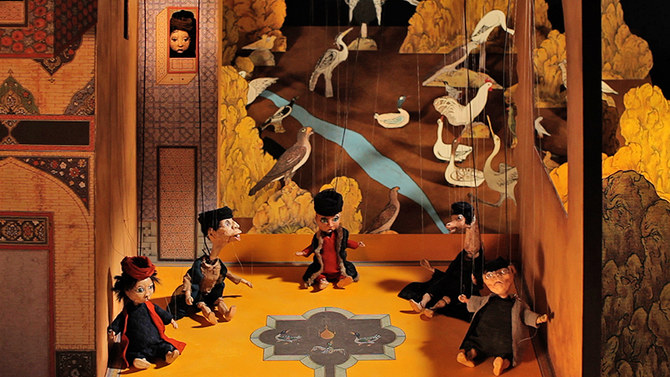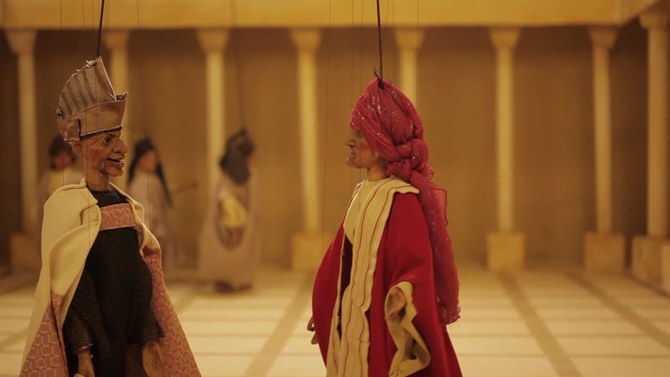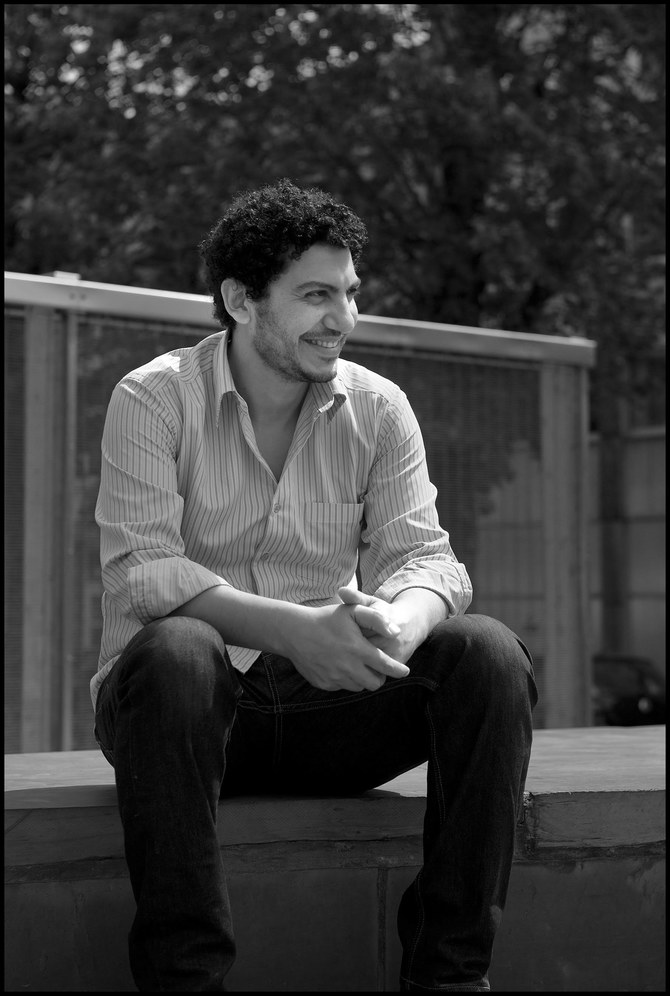LAHORE: One of the Middle East’s most celebrated contemporary artists, who recently showcased at the much talked about desert X AlUla’s inaugural art biennale in Saudi Arabia, Wael Shawky, brought his extraordinary work to Pakistan for the first time at the Lahore Biennale-- on display between Jan. 26 to Feb. 29.
Shawky’s spectacular ‘Cabaret Crusades’ installation along the walkways of the Lahore Fort Summer Palace draws on site-specific constructions and videos, playfully harnessing the boundaries between history and storytelling. This is the first time a platform for this kind of cross-cultural dialogue has been created by showcasing an internationally acclaimed artist in the backdrop of a local historical landmark.
“The summer palace was a gift,” Shawky told Arab News on Saturday.
“It’s incredible to see a Muslim city with a long history of transitions and transformations. (Lahore possesses) complexity that may be difficult to see in other Muslim Arab cities. At the same time, Lahore’s culture plays a big role in the Arab Gulf contemporary cities like Dubai, Abu Dhabi, Doha, Kuwait...” he added.
Pakistan is not new to the Egyptian artist, who gained recognition when he gave a voice to Pakistani workers in the UAE through his award-winning musical project ‘Dictums 10:120,’ originally performed for the 2013 Sharjah Biennial.
After attending the 10th Sharjah Biennale in 2011, Shawky realized that there was an unintentional disconnect-- the majority of the South Asian workforce employed in setting up the event was missing at the public events.
Therefore he came up with the idea of an artwork to highlight their cultural roots; a project that eventually took him to Pakistan’s southern city of Karachi. After a series of workshops held in Sharjah over two years, translating fragments of curatorial talks from an earlier bienniale into Urdu, and asking workers to sift through the language for meaningful phrases- the output was eventually translated into an Urdu qawwali with the help of renowned professional Pakistani qawwals, Fareed Ayaz and Abu Muhammad.
This sound piece, which examined the relationship between arts establishments and local communities, stems from Shawky’s belief that the main purpose of biennales is to bridge the gap between the local community and contemporary art.
“Working with Farid Ayyaz and Abu Muhammad was so special, it was a way to give a huge Pakistani community in UAE a voice and a dominancy over and inside art institution,” Shawky said.
“The reaction was big and positive, I think it was one of the most successful performances I have ever done,” he said.
As for his work at the Lahore Biennale 2020, Shawky uses his filming of puppet-theater to tell the story of the Crusades. In his film series Cabaret Crusades, based on a book by the French-Lebanese writer Amin Maalouf, the story of the war is told from an Arab perspective. In 2011, the first part of the trilogy, The Horror Show File (2010), made Shawky famous overnight.
A large cluster of master professionals, from native classical singers, craftsmen, and puppeteers to a full film crew, crafted these intelligible videos on elaborate sets. The magnificent, handcrafted puppets are more than enough to hypnotize the viewer emotionally and intellectually.
The hundreds of Arabic speaking puppets are clad in sumptuously oriental clothing: embroidered capes, velvet corsets or metal armor. Shawky uses a bizarre mixture of the medieval and science fiction. Puppet theater is a popular art form in Pakistan as well, but a film made from this art as opposed to a live theater show, enthralled the audience.
Each video uses different puppets and a new approach, but overall the effect is dance-like, the camera movement invigorating, the sound wisely minimal, and the songs captivating. With each successive video, Shawky expertly juxtaposes historical narrative with the childlike world of puppetry, solemnity with gullibility, terror with humor, horror with entertainment, to emphasize events that were crucial to the development of an Arab Muslim identity. Shawky does not present Arabs as victims but as active players responsible for their fate.
“In Lahore, the audience were also celebrating Cabaret Crusades, I think mainly, because I care about details and I work a lot with historical Indian miniatures as a base for my film scenography,” Shawky said.
The artist’s ambitious, multilayered film renditions look at the ways in which history and folklores are recorded, highlighting the unreliability of cultural memory, while offering critical evaluations on our current narratives of uncertainty and change.
At first sight, the videos seem like a history lesson for children, but the project eventually raises essential questions about the history of identity and consequently the role of history itself. In his words, Shawky makes a critical attempt “to translate this experience as a society that lives on their ancestor’s history.”
As with all of Shawky’s work, these hauntingly beautiful videos navigate the territory between truth and myth to raise questions about history, culture and the effect of globalization on contemporary societies.
Arab artist Wael Shawky retells history at Lahore Biennale
https://arab.news/ntj6a
Arab artist Wael Shawky retells history at Lahore Biennale

- Shawky uses his filming of puppet-theater to tell the story of the Crusades in video installations at the Lahore Fort
- Says Lahore’s culture plays big role in Arab Gulf cities like Dubai, Abu Dhabi and Kuwait
Pakistan dismisses Indian rights abuse claims, accuses New Delhi of persecuting minorities

- The exchange between the two countries took place during at the United Nations General Assembly
- Pakistan says New Delhi has ‘weaponized hate’ and ‘codified discrimination’ against its own people
ISLAMABAD: Pakistan has strongly rejected Indian allegations of minority rights violations, accusing New Delhi of persecuting its own citizens and “exporting chaos abroad,” the state-owned Associated Press of Pakistan (APP) news agency reported on Thursday.
The exchange took place during a debate in the United Nations General Assembly on the Responsibility to Protect (R2P), a global commitment aimed at preventing genocide, war crimes, ethnic cleansing and crimes against humanity.
Addressing the session, Pakistan’s Deputy Permanent Representative to the UN, Ambassador Usman Jadoon, criticized what he described as the selective application of the R2P doctrine, saying it had become “meaningless” in the face of the international community’s failure to prevent mass atrocities in Palestine and Indian-administered Kashmir.
India responded by accusing Pakistan of violating the rights of its minorities and being complicit in a recent militant attack in Pahalgam, in Indian-administered Kashmir.
Exercising her right of reply, Pakistani delegate Rabia Ijaz, a second secretary at Pakistan’s UN Mission, dismissed the accusations as “a textbook case of the perpetrator posturing as a victim.”
“A state that has weaponized hate, normalized mob violence and codified discrimination against its own citizens – and against those it occupies – has no moral standing to speak on the Responsibility to Protect,” the APP quoted her as saying.
Ijaz went on to describe India as a “majoritarian autocracy,” where minorities, particularly Muslims, Christians and Dalits, face discrimination.
“Lynching is met with silence,” she continued. “Bulldozers become tools of collective punishment. Mosques are razed. Citizenship is denied based on religion.”
“This is not the protection of people,” she added. “This is their persecution, sanctified by law and celebrated by power.”
Ijaz maintained India had launched an “unprovoked and deliberate” cross-border attack on civilian areas in Pakistan earlier this year in May, killing 35 people.
“R2P cannot become a slogan for serial violators to hide behind,” she said. “It cannot be invoked by those who deny rights at home and export chaos abroad.”
India and Pakistan have long been at odds with each other, though diplomatic tensions have intensified in recent years.
The two nuclear-armed neighbors have repeatedly traded barbs at international forums particularly after their relationship deteriorated following the recent four-day military standoff, one of the most serious flare-ups in several decades.
Pakistan thanks Saudi Arabia, pledges renewed anti-polio effort as cases hit 14

- Pakistan and Afghanistan remain only two countries where wild poliovirus is still endemic
- Saudi Arabia in April 2024 pledged $500 million to the Global Polio Eradication Initiative
ISLAMABAD: Prime Minister Shehbaz Sharif on Thursday thanked Saudi Arabia for its continued support in Pakistan’s fight against polio, as the country recorded its 14th case of the year amid growing concerns over persistent virus transmission in high-risk districts.
Chairing a meeting of the National Anti-Polio Task Force in Islamabad, Sharif said targeted immunization campaigns were being intensified to reach every child, particularly in parts of the northwestern Khyber Pakhtunkhwa province where the most cases have been reported this year.
“We pledge to protect every child in Pakistan from this crippling disease and to make Pakistan polio-free,” Sharif said, according to an official statement from his office.
“I am also thankful to His Royal Highness Crown Prince and Prime Minister of Saudi Arabia, Mohammed bin Salman, who is extending all possible support to Pakistan in the fight against polio.”
Last year, Saudi Arabia pledged $500 million to global polio eradication efforts, according to WHO. The Kingdom, alongside the Gates Foundation and other partners, is providing both technical and financial assistance to Pakistan.
Pakistan remains one of only two countries in the world where wild poliovirus is still endemic, alongside Afghanistan. According to official data, the 14 confirmed cases this year include eight from Khyber Pakhtunkhwa, four from Sindh, and one each from Punjab and Gilgit-Baltistan. In comparison, Pakistan reported 74 cases in 2024 and six in 2023.
“Despite all difficulties and challenges, the government, with the help of its international, provincial, and local teams, will soon achieve the goal of a polio-free Pakistan,” he said.
Sharif emphasized that district-level campaigns were being developed to address “unique challenges” in southern Khyber Pakhtunkhwa, where security threats and vaccine hesitancy have long impeded eradication efforts. He also reiterated that the safety of frontline polio workers remained a “top priority.”
The meeting was attended by senior health officials, provincial leaders, and members of the international Polio Oversight Board, including Dr. Christopher Elias of the Gates Foundation, WHO Regional Director Dr. Hanan Balkhy, UNICEF’s Sanjay Wijesekera, and representatives from Rotary International and Saudi Arabia’s KS Relief.
Polio immunization campaigns have been launched in more than 80 districts this year, reaching tens of millions of children. But officials have repeatedly warned that virus circulation in environmental samples signals the need for sustained vigilance.
“We must ensure, with full dedication and seriousness, that every child across the country receives multiple doses of the vaccine and remains protected from polio,” Sharif added.
Pakistan and Afghanistan are the only two countries where polio remains endemic. Islamabad made significant progress in curbing the virus, with annual cases dropping from around 20,000 in the early 1990s to just eight in 2018. Pakistan reported six cases in 2023 and only one in 2021 but witnessed an intense resurgence in 2024, with 74 cases reported.
Pakistan has faced years of setbacks in its eradication drive, with vaccination teams often targeted by militants and health misinformation slowing uptake in rural areas.
Afghan refugees stuck in Pakistan as Germany halts entry program

- Berlin halts at-risk Afghan resettlement as political shift curbs migration pathways
- Over 2,400 Afghans await entry as suspended admission program under review
BERLIN/ISLAMABAD, July 3 : In a cramped guesthouse in Pakistan’s capital, 25-year-old Kimia spends her days sketching women — dancing, playing, resisting — in a notebook that holds what’s left of her hopes.
A visual artist and women’s rights advocate, she fled Afghanistan in 2024 after being accepted on to a German humanitarian admission program aimed at Afghans considered at risk under the Taliban.
A year later, Kimia is stuck in limbo.
Thousands of kilometers away in Germany, an election in February where migration dominated public debate and a change of government in May resulted in the gradual suspension of the program.
Now the new center-right coalition intends to close it.
The situation echoes that of nearly 1,660 Afghans cleared to settle in the United States, but who then found themselves in limbo in January after US President Donald Trump took office and suspended refugee programs.
Kimia’s interview at the German embassy which she hoped would result in a flight to the country and the right to live there, was abruptly canceled in April.
Meanwhile, Germany pays for her room, meals and medical care in Islamabad.
“All my life comes down to this interview,” she told Reuters. She gave only her artist name for fear of reprisal.
“We just want to find a place that is calm and safe,” she said of herself and the other women at the guesthouse.
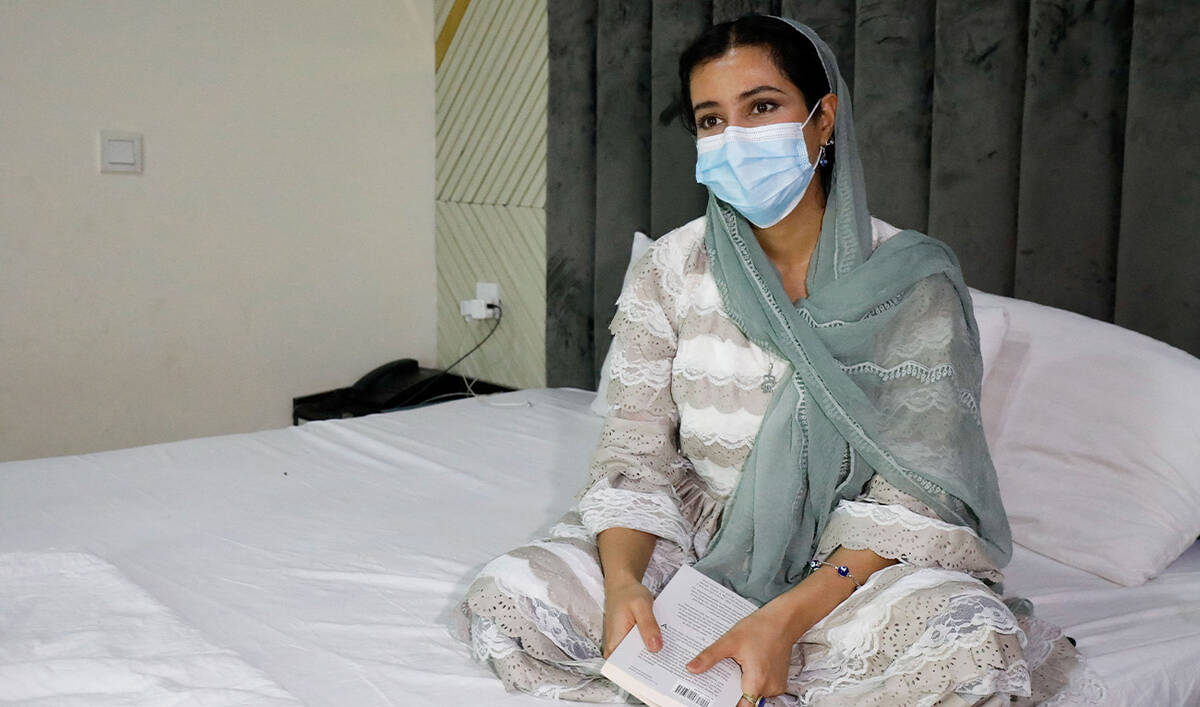
The admission program began in October 2022, intending to bring up to 1,000 Afghans per month to Germany who were deemed at risk because of their work in human rights, justice, politics or education, or due to their gender, religion or sexual orientation.
However, fewer than 1,600 arrived in over two years due to holdups and the cancelation of flights.
Today, around 2,400 Afghans are waiting to travel to Germany, the German foreign ministry said. Whether they will is unclear. NGOs say 17,000 more are in the early stages of selection and application under the now dormant scheme.
The foreign ministry said entry to Germany through the program was suspended pending a government review, and the government will continue to care for and house those already in the program.
It did not answer Reuters’ questions on the number of canceled interviews, or how long the suspension would last.
Reuters spoke with eight Afghans living in Pakistan and Germany, migration lawyers and advocacy groups, who described the fate of the program as part of a broader curb on Afghan asylum claims in Germany and an assumption that Sunni men in particular are not at risk under the Taliban.
The German government says there is no specific policy of reducing the number of Afghan migrants. However, approval rates for Afghan asylum applicants dropped to 52 percent in early 2025, down from 74 percent in 2024, according to the Federal Migration Office (BAMF).
POLITICAL SHIFT
Kabul fell to the Taliban in August 2021. Since May 2021 Germany has admitted about 36,500 vulnerable Afghans by various pathways including former local staff, the government said.
Thorsten Frei, chief of staff to Germany’s new chancellor Friedrich Merz, said humanitarian migration has now reached levels that “exceed the integration capacity of society.”
“As long as we have irregular and illegal migration to Germany, we simply cannot implement voluntary admission programs.”
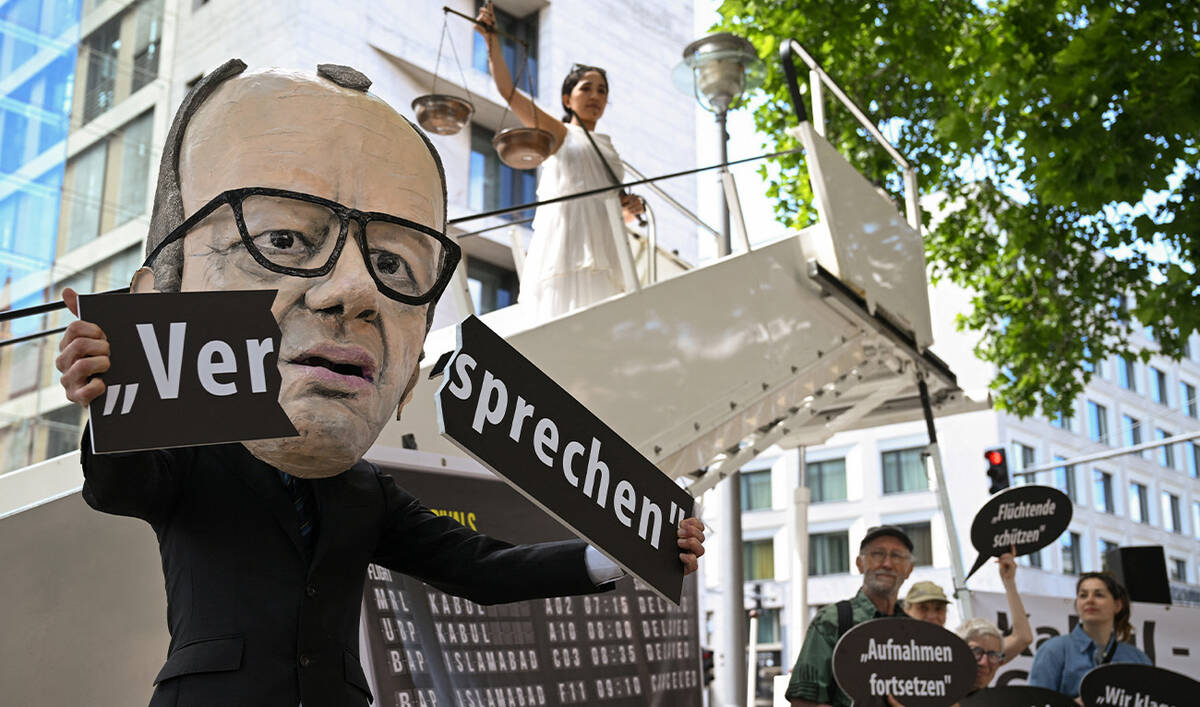
The interior ministry said programs like the one for Afghans will be phased out and they are reviewing how to do so.
|Several Afghans are suing the government over the suspension. Matthias Lehnert, a lawyer representing them, said Germany could not simply suspend their admissions without certain conditions such as the person no longer being at risk.
Since former chancellor Angela Merkel opened Germany’s borders in 2015 to over a million refugees, public sentiment has shifted, partly as a result of several deadly attacks by asylum seekers. The far-right Alternative for Germany party (AfD), capitalizing on the anti-migrant sentiment, surged to a historic second-place finish in February’s election.
Afghans Reuters spoke with said they feared they were being unfairly associated with the perpetrators, and this was putting their own lives at risk if they had to return to Afghanistan.
“I’m so sorry about those people who are injured or killed ... but it’s not our fault,” Kimia said.
Afghan Mohammad Mojib Razayee, 30, flew to Germany from Cyprus in March under a European Union voluntary solidarity mechanism, after a year of waiting with 100 other refugees. He said he was at risk after criticizing the Taliban. Two weeks after seeking asylum in Berlin, his application was rejected.
He was shocked at the ruling. BAMF found no special protection needs in his case, a spokesperson said.
“It’s absurd — but not surprising. The decision-making process is simply about luck, good or bad,” said Nicolas Chevreux, a legal adviser with AWO counseling center in Berlin.
Chevreux said he believes Afghan asylum cases have been handled differently since mid-2024, after a mass stabbing at a rally in the city of Mannheim, in which six people were injured and a police officer was killed. An Afghan asylum seeker was charged and is awaiting trial.
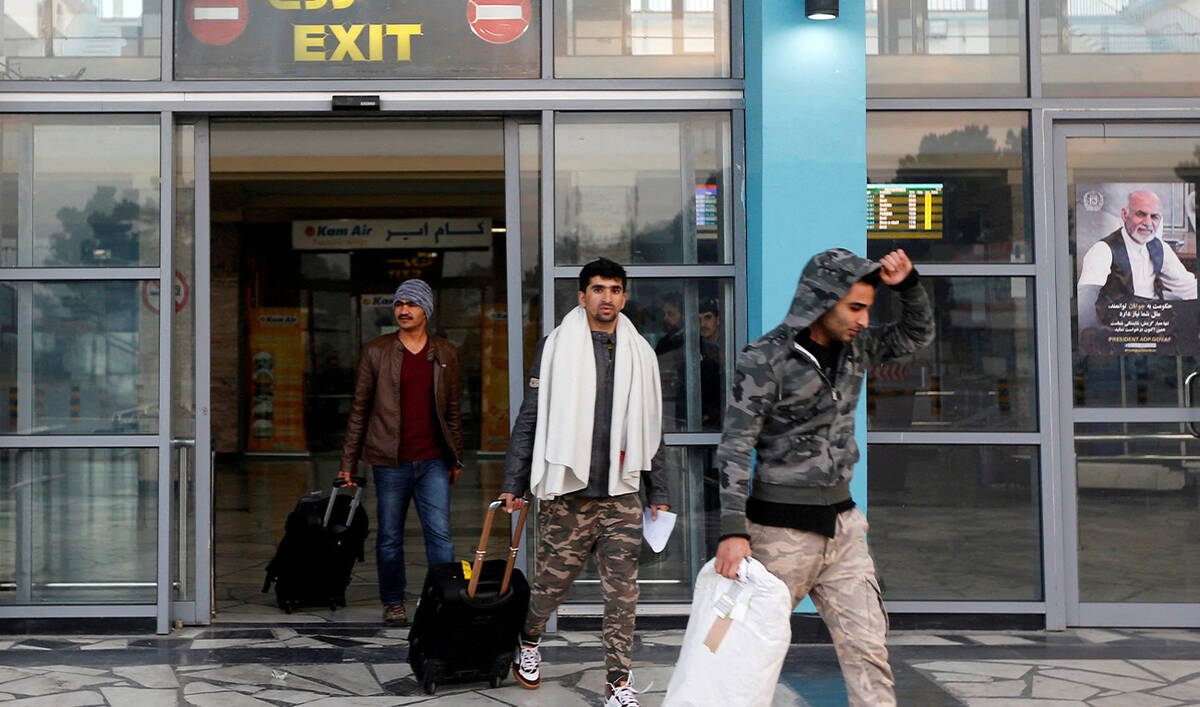
‘YOU DON’T LIVE’
Spending most days in her room, surrounded by English and German textbooks, Kimia says returning to Afghanistan is unthinkable. Her art could make her a target.
“If I go back, I can’t follow my dreams — I can’t work, I can’t study. It’s like you just breathe, but you don’t live.”
Under Taliban rule, women are banned from most public life, face harassment by morality police if unaccompanied by a male guardian, and must follow strict dress codes, including face coverings. When security forces raided homes, Kimia said, she would frantically hide her artwork.
The Taliban say they respect women’s rights in accordance with their interpretation of Islamic law and local culture and that they are not targeting former foes.
Hasseina, is a 35-year-old journalist and women’s rights activist from Kabul who fled to Pakistan and was accepted as an applicant on to the German program.
Divorced and under threat from both the Taliban and her ex-husband’s family, who she says have threatened to kill her and take her daughter, she said returning is not an option.
The women are particularly alarmed as Pakistan is intensifying efforts to forcibly return Afghans. The country says its crackdown targets all undocumented foreigners for security reasons. Pakistan’s foreign ministry did not respond to request for comment on how this affects Afghans awaiting German approval.
The German foreign ministry has said it is aware of two families promised admission to Germany who were detained for deportation, and it was working with Pakistan authorities to stop this.
Marina, 25, fled Afghanistan after being separated from her family. Her mother, a human rights lawyer, was able to get to Germany. Marina has been waiting in Pakistan to follow her for nearly two years with her baby.
“My life is stuck, I want to go to Germany, I want to work, I want to contribute. Here I am feeling so useless,” she said.
Pakistan PM Sharif in Azerbaijan for ECO summit focused on climate, trade

- Regional leaders gather in Baku to discuss sustainable development, connectivity
- PM Sharif expected to reaffirm Pakistan’s commitment to ECO Vision 2025
ISLAMABAD: Pakistani Prime Minister Shehbaz Sharif will be in Azerbaijan from today, Thursday, to attend the two-day 17th Economic Cooperation Organization (ECO) summit in Baku, where regional leaders will meet to discuss sustainable growth, climate resilience and increased intra-regional trade.
The theme of this year’s summit is “New ECO Vision for a Sustainable and Climate Resilient Future.” The ECO is a 10-member regional bloc comprising countries from Central and South Asia, the Caucasus, and the Middle East.
According to a report published in state broadcaster Radio Pakistan, Sharif will lead the Pakistani delegation and “share Pakistan’s perspective on key regional and global challenges.”
The report said he will also “reaffirm Pakistan’s commitment to the ECO Vision 2025 and advocate for enhanced intra-regional trade, transport connectivity, energy cooperation, and sustainable development.”
On the sidelines of the summit, Sharif is scheduled to hold bilateral meetings with other ECO leaders to discuss matters of mutual interest.
This marks Sharif’s second visit to Azerbaijan this year. He last traveled to Baku in May 2025, where he met with Azerbaijani President Ilham Aliyev and discussed deepening bilateral cooperation in energy and trade.
The ECO was established in 1985 by Iran, Turkiye, and Pakistan, and was expanded later to include Afghanistan, Azerbaijan, Kazakhstan, Kyrgyzstan, Tajikistan, Turkmenistan, and Uzbekistan. The organization aims to promote economic, technical, and cultural cooperation among member states.
Hindu pilgrimage begins at Kashmir site where April attack triggered brief war with Pakistan

- Last year, half a million devotees took part in the Amarnath pilgrimage to a cave above the town of Pahalgam
- Pahalgam is site where April 22 attack killed 26 tourists, unleashing brief but intense war with neighboring Pakistan
PAHALGAM, India: Hindus began a vast month-long pilgrimage in contested Indian Kashmir on Thursday, with many of the faithful starting from near the site where a deadly April attack triggered conflict with Pakistan.
Last year, half a million devotees took part in the Amarnath pilgrimage to a sacred ice pillar located in a cave in the forested Himalayan hills above the town of Pahalgam.
Pahalgam is the site where gunmen on April 22 killed 26 mostly Hindu tourists.
New Delhi said the gunmen were backed by Pakistan, claims Islamabad rejected — triggering a series of tit-for-tat diplomatic measures that escalated into a four-day conflict.
It was the worst standoff by the nuclear-armed nations since 1999, with more than 70 people killed in missile, drone and artillery fire on both sides, before a May 10 ceasefire.
But pilgrim Muneshwar Das Shashtri, who traveled from Uttar Pradesh state, told AFP “there is no fear of any kind.”
“Our army is standing guard everywhere. No one can raise a finger toward us,” he said.
India has ramped up security for the event, deploying 45,000 troops with high-tech surveillance tools overseeing the grueling trek to reach the high-altitude cave, dedicated to the Hindu deity of destruction Shiva.
“We have multi-layered and in-depth security arrangements so that we can make the pilgrimage safe and smooth for the devotees,” said VK Birdi, police chief for the Muslim-majority territory.
At Pahalgam, soldiers have turned a tented base camp into a fortress encircled by razor wire.
Troops in newly deployed armored cars, or from gun positions behind sandbags, keep a close watch — efforts boosted by facial recognition cameras.
“High-quality surveillance cameras have been installed at all major points along the route,” said Manoj Sinha, the Indian-appointed top administrator for Jammu and Kashmir.
All pilgrims must be registered and travel in guarded vehicle convoys, until they start out to walk.
Camouflaged bunkers have been erected in the forests along the route, where dozens of makeshift kitchens provide free food.
Electronic radio cards pinpoint their location.
Pilgrims can take several days to reach the cave, perched at 3,900 meters (12,800 feet) high, around 30 kilometers (18 miles) uphill from the last easily motorable track.
“Whatever the attack that was carried out here, I am not afraid. I have come to get a glimpse of baba (the ice formation)” said Ujwal Yadav, 29, from India’s Uttar Pradesh state, undertaking his first pilgrimage to the shrine.
“Such are the security arrangements here that no one can be hurt.”
Sinha has said that “public confidence is returning,” but admits that pilgrim registration had dipped by 10 percent this year.
Once a modest, little-known ritual, attended by only a few thousand mainly local devotees, the pilgrimage has grown since an armed insurgency erupted in 1989.
India’s government has since heavily promoted the annual event, which runs until August 9.
Rebels fighting against India’s control of Kashmir have said the pilgrimage is not a target, but have warned they would act if it was used to assert Hindu dominance.
In 2017, suspected rebels attacked a pilgrim bus, killing 11 people.
The gunmen who carried out the April 22 killings remain at large, despite the manhunt by security forces in Kashmir where India has half a million soldiers permanently deployed.
On June 22, India’s National Investigation Agency said two men had been arrested from the Pahalgam area who they said had “provided food, shelter and logistical support” to the gunmen.
Indian police have issued wanted notices for three of the gunmen, two of whom they said were Pakistani citizens. Pakistani has rejected the claim.




